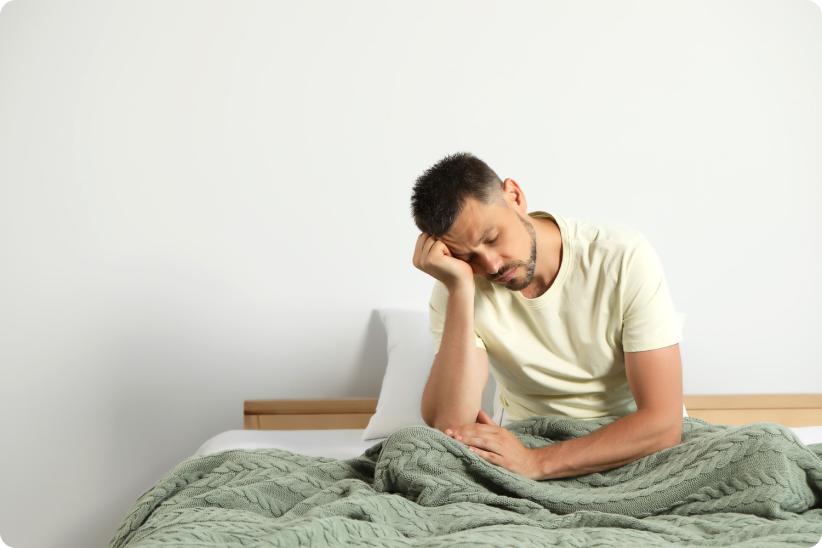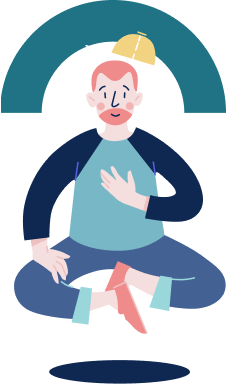Dreaming of Better Sleep? 8 Actionable Steps to Nightly Bliss
19th Jan. 2021
5min read
Sleep

Are you tired of tossing and turning at night, counting sheep, or scrolling through your phone hoping to fall asleep?
If so, you're not alone.
In our fast-paced world, where screens dominate our days and stress often follows us to bed, getting a good night's sleep can feel like a distant dream.
But here's the good news: it doesn't have to be this way.
With a few adjustments to your daily routine and mindset, you can transform your sleep quality and, by extension, your life.
Let's Dive into 8 Actionable Tips to Optimise your Sleep:
1. Establish a Regular Sleep Schedule
As a result, you'll find yourself naturally feeling sleepy at bedtime and more alert during the day.
2. View Morning Sunlight
Improving sleep isn't just about the actions we take before bed. Exposure to natural light in the morning, even for just 5-10 minutes, can significantly improve our sleep quality at night.
Viewing morning sunlight is particularly beneficial for two key reasons:
1. It triggers a healthy release of cortisol, acting as a 'wake-up' signal and enhancing our alertness throughout the day.
2. It sets a timer for the release of melatonin at night, making us more likely to feel sleepy when it's time for bed.
3. Develop a Calming Pre-Sleep Routine
Your brain thrives on patterns and associations.
By establishing a serene and consistent pre-sleep ritual, you signal to your brain that it's time to wind down and prepare for sleep.
This could include activities like reading, a warm bath, or some gentle stretching.
Over time, these activities become cues that help trigger feelings of drowsiness as part of your body's natural preparation for sleep.
4. Dim the Lights
Light, especially the blue light emitted by electronic devices, can disrupt your body's natural sleep-wake cycle.
It acts as a potent 'wake-up' signal, inhibiting the production of melatonin, the hormone responsible for making you feel sleepy.
As bedtime approaches, consider dimming the lights in your home and, ideally, opting for relaxing activities that don't involve screens.
If you insist on continuing to use your phone, turning down the brightness can help mitigate some of the disruptive effects on your sleep cycle.
5. Limit Caffeine and Alcohol
Even if caffeine doesn't seem to hinder your ability to fall asleep, and alcohol's initial sedative effect makes it easier to drift off, both substances can significantly compromise the quality of your sleep.
This means that despite logging enough hours of sleep, you may wake up feeling unrefreshed.
Caffeine has a quarter-life of about 8 hours. So, if you drink a cup of coffee at 2 PM, roughly a quarter of that caffeine remains active in your system by 10 PM. This residual caffeine can significantly impact the quality of your sleep, leading to a less restful night and potential grogginess the following morning.
Despite alcohol's ability to make you feel drowsy initially, it disrupts the quality of your sleep by inhibiting REM sleep, essential for memory, restoration, cognitive functions, and mood regulation.
As alcohol's sedative effects wear off, you're also more likely to experience disturbances, such as frequently waking up during the night, which further degrades the quality of your rest.
6. Turn Down the Temperature
To fall asleep and stay asleep, your body needs to lower its core temperature by about one degree Celsius.
For this reason, it’s easier for us to fall asleep in a room that’s too cold compared to a room that’s too hot.
As an additional tip, taking a warm shower or bath before bedtime can be beneficial for facilitating the onset of sleep. The subsequent drop in body temperature once you leave the warmth of the water replicates the natural decrease needed to initiate sleep, which can help induce sleepiness.
7. Keep Your Bed for Sleeping Only (and Sexy Time)
Ever heard of Pavlov's dogs?
Well, just as they learned to associate the sound of a bell with food, our brains form similar associations between environments and activities.
When we're constantly doing stimulating stuff like working or binge-watching shows in bed, our brains start associating it with being active rather than winding down.
This can mess with our ability to switch off and drift into sleep mode when it's time for lights out.
8. Manage Stress & Anxiety
Stress and anxiety activate our body's stress response, flooding our systems with hormones that prepare us for action.
Aiming for relaxation and peaceful sleep when our mind and bodies are on high alert is not the easiest of endeavours…
Implementing stress-management techniques and relaxation strategies, such as controlled breathing, progressive muscle relaxation, listening to calming music, and journaling, can significantly ease the tension in both mind and body.
Additionally, by prioritizing work-life balance, setting boundaries, and carving out time for rest and rejuvenation, we create a healthier environment for managing stress and promoting overall well-being.
Conclusion
By adopting these eight simple steps, you're on your way to transforming your nights from restless to restful.
Remember, good sleep isn't just a dream—it's within your reach.
Start small, maybe by dimming the lights or tweaking your bedtime routine, and soon, you’ll start to notice a significant improvement in your sleep quality. Over time, these changes can lead to a more energised, productive, and happier you during the day.
Remember, investing in your sleep is investing in yourself.
Sweet dreams!
If so, you're not alone.
In our fast-paced world, where screens dominate our days and stress often follows us to bed, getting a good night's sleep can feel like a distant dream.
But here's the good news: it doesn't have to be this way.
With a few adjustments to your daily routine and mindset, you can transform your sleep quality and, by extension, your life.
Let's Dive into 8 Actionable Tips to Optimise your Sleep:
1. Establish a Regular Sleep Schedule
As a result, you'll find yourself naturally feeling sleepy at bedtime and more alert during the day.
2. View Morning Sunlight
Improving sleep isn't just about the actions we take before bed. Exposure to natural light in the morning, even for just 5-10 minutes, can significantly improve our sleep quality at night.
Viewing morning sunlight is particularly beneficial for two key reasons:
1. It triggers a healthy release of cortisol, acting as a 'wake-up' signal and enhancing our alertness throughout the day.
2. It sets a timer for the release of melatonin at night, making us more likely to feel sleepy when it's time for bed.
3. Develop a Calming Pre-Sleep Routine
Your brain thrives on patterns and associations.
By establishing a serene and consistent pre-sleep ritual, you signal to your brain that it's time to wind down and prepare for sleep.
This could include activities like reading, a warm bath, or some gentle stretching.
Over time, these activities become cues that help trigger feelings of drowsiness as part of your body's natural preparation for sleep.
4. Dim the Lights
Light, especially the blue light emitted by electronic devices, can disrupt your body's natural sleep-wake cycle.
It acts as a potent 'wake-up' signal, inhibiting the production of melatonin, the hormone responsible for making you feel sleepy.
As bedtime approaches, consider dimming the lights in your home and, ideally, opting for relaxing activities that don't involve screens.
If you insist on continuing to use your phone, turning down the brightness can help mitigate some of the disruptive effects on your sleep cycle.
5. Limit Caffeine and Alcohol
Even if caffeine doesn't seem to hinder your ability to fall asleep, and alcohol's initial sedative effect makes it easier to drift off, both substances can significantly compromise the quality of your sleep.
This means that despite logging enough hours of sleep, you may wake up feeling unrefreshed.
Caffeine has a quarter-life of about 8 hours. So, if you drink a cup of coffee at 2 PM, roughly a quarter of that caffeine remains active in your system by 10 PM. This residual caffeine can significantly impact the quality of your sleep, leading to a less restful night and potential grogginess the following morning.
Despite alcohol's ability to make you feel drowsy initially, it disrupts the quality of your sleep by inhibiting REM sleep, essential for memory, restoration, cognitive functions, and mood regulation.
As alcohol's sedative effects wear off, you're also more likely to experience disturbances, such as frequently waking up during the night, which further degrades the quality of your rest.
6. Turn Down the Temperature
To fall asleep and stay asleep, your body needs to lower its core temperature by about one degree Celsius.
For this reason, it’s easier for us to fall asleep in a room that’s too cold compared to a room that’s too hot.
As an additional tip, taking a warm shower or bath before bedtime can be beneficial for facilitating the onset of sleep. The subsequent drop in body temperature once you leave the warmth of the water replicates the natural decrease needed to initiate sleep, which can help induce sleepiness.
7. Keep Your Bed for Sleeping Only (and Sexy Time)
Ever heard of Pavlov's dogs?
Well, just as they learned to associate the sound of a bell with food, our brains form similar associations between environments and activities.
When we're constantly doing stimulating stuff like working or binge-watching shows in bed, our brains start associating it with being active rather than winding down.
This can mess with our ability to switch off and drift into sleep mode when it's time for lights out.
8. Manage Stress & Anxiety
Stress and anxiety activate our body's stress response, flooding our systems with hormones that prepare us for action.
Aiming for relaxation and peaceful sleep when our mind and bodies are on high alert is not the easiest of endeavours…
Implementing stress-management techniques and relaxation strategies, such as controlled breathing, progressive muscle relaxation, listening to calming music, and journaling, can significantly ease the tension in both mind and body.
Additionally, by prioritizing work-life balance, setting boundaries, and carving out time for rest and rejuvenation, we create a healthier environment for managing stress and promoting overall well-being.
Conclusion
By adopting these eight simple steps, you're on your way to transforming your nights from restless to restful.
Remember, good sleep isn't just a dream—it's within your reach.
Start small, maybe by dimming the lights or tweaking your bedtime routine, and soon, you’ll start to notice a significant improvement in your sleep quality. Over time, these changes can lead to a more energised, productive, and happier you during the day.
Remember, investing in your sleep is investing in yourself.
Sweet dreams!



